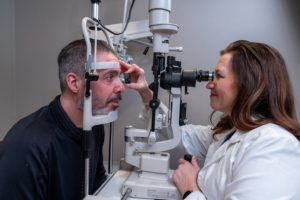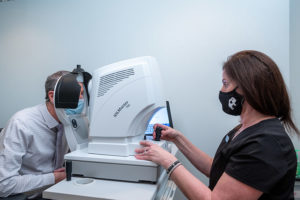GLAUCOMA
Glaucoma is often called the “sneak thief of sight” as there are no early symptoms. If left untreated, glaucoma can lead to severe loss of vision, and even blindness. As the leading cause of visual impairment and blindness in the US, glaucoma affects patients of all ages. Although glaucoma cannot be cured, it can be controlled.
There are two types of glaucoma: open- and closed-angle. Open-angle glaucoma is the more common type and occurs when the eye’s nourishing clear fluid (aqueous) drains too slowly through the drainage system in the corners of the eye called the trabecular meshwork. This places pressure on the delicate optic nerve, which is responsible for sending visual signals to the brain. A damaged optic nerve causes impaired or lost vision. Close-angle glaucoma (or angle-closure) occurs when there is a sudden buildup of pressure in the eye due to narrowing of the drainage angle between the iris and cornea. Both forms of glaucoma are treatable at Visionary Ophthalmology and Cataract Care.
Treatment
 Visionary Ophthalmology offers proven treatments to treat glaucoma including medicine, laser surgery, filtration surgery, and minimally invasive surgery (MIGS). The goal of all treatments is to relieve pressure within the eye. As there is no cure for glaucoma, these medical and surgical treatments are administered to relieve symptoms and prevent further damage to your eyes.
Visionary Ophthalmology offers proven treatments to treat glaucoma including medicine, laser surgery, filtration surgery, and minimally invasive surgery (MIGS). The goal of all treatments is to relieve pressure within the eye. As there is no cure for glaucoma, these medical and surgical treatments are administered to relieve symptoms and prevent further damage to your eyes.
The recommended treatment is based on the severity of your glaucoma. If medication or eye drops do not relieve your symptoms, you may need laser treatment surgery or a more conventional surgical procedure. This is determined on an individual basis and the team at Visionary Ophthalmology is prepared to discuss your options with you in greater detail during your exam.
Prevention
There is no guaranteed method of preventing glaucoma. The best way to protect your eyes from glaucoma, and other degenerative eye diseases, is to have your eyes examined regularly. Visionary Ophthalmology recommends patients have a comprehensive eye exam at least once every year. The following examinations are very important to detect glaucoma early:
-
- Tonometry: A simple and painless measurement of the pressure in the eye.
- Ophthalmoscopy: An examination of the back of the eye to observe the health of the optic nerve.
- Visual Field Test: A check for the development of abnormal blind spots.
- Optical Computerized Tomography: Allows precise study of tiny nerve fibers in the back of the eye
Anyone can develop glaucoma, however some patients are at a higher risk than others. These higher-risk patients should schedule an eye exam more frequently to ensure healthy eyes:
-
 Over the age of 40
Over the age of 40- Diabetics
- African Americans or Hispanic-Americans
- Family history of glaucoma
- Poor vision, especially patients who are very nearsighted
Glaucoma Laser Treatments
If eye drops or other medicines are not viable options, surgical laser treatment to relieve symptoms of glaucoma may be your best treatment method. The type of laser surgery for your eyes will depend on the form and severity of glaucoma you experience.
There are several types of laser surgical procedures to treat glaucoma. They include argon laser trabeculoplasty (ALT), micropulse laser trabeculoplasty (MLT), laser peripheral iridotomy (LPI), and endocyclophotocoagulation (ECP). ALT and MLT are both used to treat open-angle glaucoma by applying tiny laser energy spots to the damaged drainage channels (trabecular meshwork).
LPI is used to treat closed-angle glaucoma. The laser creates a small opening in the iris, allowing aqueous to freely flow again. In ECP, laser energy is directed inside the eye using fiberoptics and a miniature video camera.
The newest form of glaucoma surgery is Micro-Invasive Glaucoma Surgery, commonly called MIGS. Recently developed, MIGS procedures reduce complications of standard surgery. MIGS procedures work by using microscopic-sized equipment and tiny incisions. MIGS provide improved safety while usually providing mild-to-moderate pressure lowering.
MIGS procedures will not eliminate traditional glaucoma surgery, but have greatly decreased the number of patients who require more invasive surgeries to control their eye pressure.
Get In Touch
(716) 634-4441
Location
40 N Union Rd #4
Williamsville, NY 14221
Open Hours
Mon: 8:00am – 4:30pm
Tue: 8:00am – 4:30pm
Wed: 8:00am – 4:30pm
Thur: 8:00am – 4:30pm
Fri: 8:00am – 4:30pm
Sat: Closed
Sun: Closed
